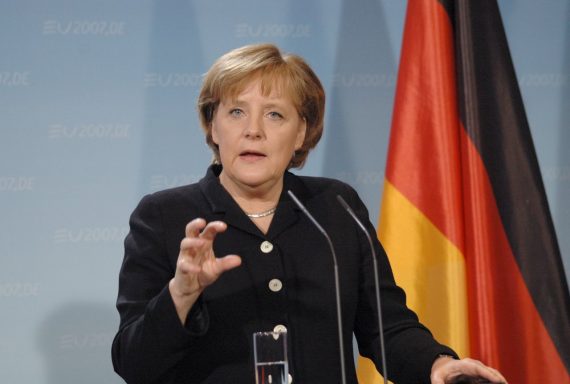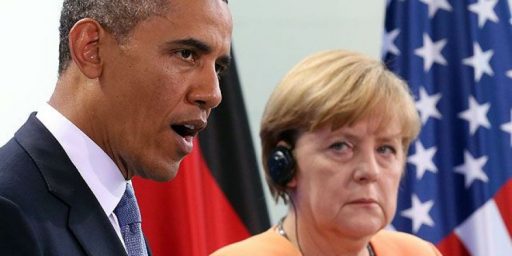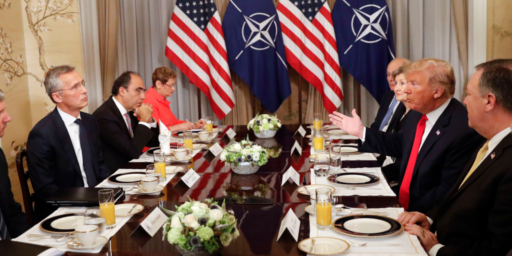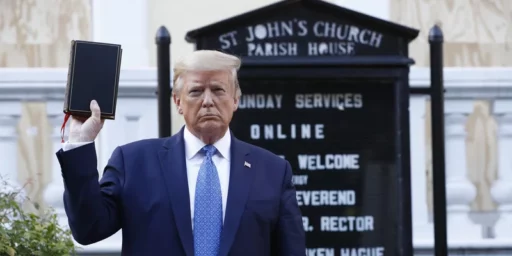On German Democracy
Negotiations over government formation is not a crisis.
 Germany is currently going through difficult negotiations over the formation of a government. Via the NYT: Germany Fails to Form Coalition; Next Move Unclear
Germany is currently going through difficult negotiations over the formation of a government. Via the NYT: Germany Fails to Form Coalition; Next Move Unclear
Chancellor Angela Merkel’s attempt to form a new German government collapsed on Sunday as one of the four parties she was seeking to bind together walked out after hours of negotiations, citing irreconcilable differences and throwing open the question of what comes next.
The chancellor had set Friday as the deadline for reaching an agreement among the Free Democrats, the ecologist Greens and the Christian Social Union, which forms a conservative bloc with Ms. Merkel’s Christian Democrats. From the outset, the parties had differed widely on key issues, especially migration and climate policies, and the talks were tense.
After intense meetings among negotiators and party leaders over the weekend failed to produce any breakthroughs, Christian Lindner, the head of the Free Democrats, told reporters that his party was quitting the talks.
This has lead to some histrionics (see, e.g., Slate: The End of German Stability ). However, The Economist has a somewhat calmer (and accurate) response: Reports of the death of German stability are greatly exaggerated.
Though a serious headache for Mrs Merkel, the deadlock in Berlin is a sign of Germany’s representative democracy working as it should. The country’s society has become more plural in recent years, so the system has produced more parties (seven, up from four) with parliamentary mandates to represent that variety—a valuable adaptation mechanism that barely exists in majoritarian electoral systems in the Anglo-Saxon world, but which makes forming a government fiddlier.
[…]
The alternative path leads to new elections, her preferred option. These could break the deadlock. Snap polls taken yesterday suggest voters may punish the FDP for its walk-out. Perhaps they would even enable the parties to face up to thorny subjects, such as the future of the euro zone, that went disappointingly unconfronted in last summer’s sleepy election campaign.
Germany has an electoral system that does a pretty good job of representing the various divisions within the population, and hence as noted above, a more plural Germany means more parties. This does lead to the need to negotiate over how to govern, and hence to form a cabinet. This is not a bad thing for a democracy to have to do (and mitigates against a winner-take-all mentality that requires more inclusivity). The fact that an impasse could lead to new elections underscores where the real power lies (in the public).
Further, a minority government is a fully viable option–it just means more negotiation for legislation on a case-by-case basis that takes into consideration the given majority viewpoint on each item. Again, from a democratic theory point of view, this not a bad thing.
h/t: Matthew Shugart.






At this point the two greatest likelihoods are either they’ll call for a new election or they’ll form a minority government. I’m guessing the latter.
As you say, not necessarily a bad thing.
There’s been a lot of sniggering in the UK on the part of the Brexiters about Germany’s political difficulties, while the Remainers comment back that even in “crisis” Germany is working much more smoothly than Britain’s present Tory fiasco.
(Note: two EU agencies, the European Medical Agency and the European Bank Agency (or whatever it’s called) are moving, respectively, to Amsterdam and Paris. John Major’s original action of getting them in London was considered a feather in his cap. Now it’s all getting washed down the drain….)
Hard to think of a historical action as stupid as the U.K. voting for Brexit, but Trump’s election in the US is pretty close.
@grumpy realist: That is just projecting, IMHO. German having to negotiate cabinet formation is not in the same universe as the own-goal that was Brexit.
Thanks for the post! I’d grown concerned (and frustrated at the lack of American coverage – my ‘deutche’ is not so ‘sprachen’ these days).
BTW, there was an Op-Ed in the NYTimes yesterday that explained the situation (to my satisfaction anyhow) including the ‘Jamaica’ tag for the negotiating stance of the principals.
@Steven L. Taylor: Yes. The Brexiteers also have this odd idea that Angela Merkel’s problems mean that Germany will give in to the U.K. on all fronts and the U.K. “can have its cake and eat it too” and all Brexit negotiation problems will be solved.
This totally ignores the fact that France is even more hard-nosed about the Brexit negotiations than Germany is.
We’re not talking brains, here.
It’s more than a little revealing that you decline to get into any of the specifics about why the latest coalition talks collapsed. For example, this is from the NYT story on Monday.
“The political instability stems from the elections in Germany on Sept. 24, when Ms. Merkel’s Christian Democrats finished first. But their share of the overall vote dropped significantly, while the far-right Alternative for Germany scored a record vote, entering Parliament for the first time as the third-biggest grouping.”
Saying the issue is “Germany has become more plural” without considering WHY people are turning to those other political parties seems willfully obtuse.
But then again, applying such an Officer Barbrady-level of analysis to anything that doesn’t involve Donald Trump has pretty much become standard operating procedure around here.
Mike
Germany is becoming more politically unstable. Concentrating on actions at the top of societies does not reveal, it masks. Opinion polls show deep dissatisfaction among the German people with the system itself.